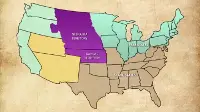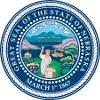The Making of the 50 States: Nebraska
Part 2: The Rest of the Story The U.S. Government passed the Indian Removal Act in 1830, providing for the relocation of Native Americans further west. After this, travel through and settlement in what is now Nebraska grew. The Oregon Trail snaked through the southern and western areas, and Fort Kearny was founded in 1848 along this route. John C. Fremont traveled through the area in the 1840s and is credited by some historians with giving the state its name, following an earlier precedent by Bourgmont (Nebraskier). 
In 1844, Illinois Sen. Stephen A. Douglas proposed a bill in Congress to organize the Nebraska Territory. The bill did not pass. It wasn't until ten years later that Nebraska obtained territory status, through the Kansas-Nebraska Act. Settlement in Nebraska surged. The sight of wagon trains bearing settling on their way to new homes in the West was a common sight. The discovery of gold in Wyoming in 1859 accelerated this. In 1860 and 1861, Pony Express followed the Platte River route, carrying mail to California. A further boost to expanded settlement came in 1862, with the passage of the Homestead Act. Congress assigned parts of the Nebraska Territory to Colorado and the Dakota Territory in 1861. On the flip side, the creation of Dakota Territory coincided with Nebraska's being given part of the Utah Territory and the Washington Territory. No battles were fought in the Nebraska Territory during the Civil War. The territory did, however, contribute to the Union war effort, sending more than 3,000 soldiers to the front. 
Nebraska residents approved a constitution in 1866 and applied for statehood. Congress approved the proposal, but President Andrew Johnson vetoed the bill. Both the House of Representatives and the Senate voted to override Johnson's veto, and Nebraska became a state on March 1, 1867, with Omaha as the first capital. First page > In the Beginning > Page 1, 2 |
|
Social Studies for Kids
copyright 2002–2024
David White




